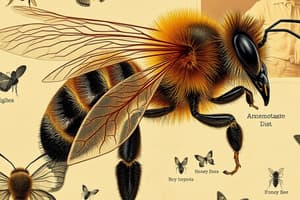Podcast
Questions and Answers
What is a key benefit of engaging theorists in research activities within early childhood education?
What is a key benefit of engaging theorists in research activities within early childhood education?
- It focuses solely on theoretical models.
- It discourages inquiry and discovery.
- It enhances their practical skills. (correct)
- It limits their intellectual pursuits.
What is a key strategy for supporting reflectors among Early Childhood Educators?
What is a key strategy for supporting reflectors among Early Childhood Educators?
- Providing immediate feedback without reflection time
- Limiting observational opportunities
- Structured shadowing programs (correct)
- Encouraging independent work with no guidance
Reflectors benefit from environments where they can apply information immediately without processing.
Reflectors benefit from environments where they can apply information immediately without processing.
False (B)
Match the type of educator with their preferred learning approach:
Match the type of educator with their preferred learning approach:
Which strategy is particularly beneficial for supporting theorists?
Which strategy is particularly beneficial for supporting theorists?
Match the learning strategy with the educator type:
Match the learning strategy with the educator type:
Which of the following is an analytical activity suitable for theorists?
Which of the following is an analytical activity suitable for theorists?
What facilitates a deeper analysis for reflectors in group settings?
What facilitates a deeper analysis for reflectors in group settings?
Which learning style thrives on new experiences and hands-on learning?
Which learning style thrives on new experiences and hands-on learning?
Match the following learning styles with their characteristics:
Match the following learning styles with their characteristics:
Which strategy helps support activist learning styles?
Which strategy helps support activist learning styles?
Match the following strategies with the corresponding learning style:
Match the following strategies with the corresponding learning style:
What is a recommended method for engaging pragmatist learners?
What is a recommended method for engaging pragmatist learners?
Which pairing of learning style and characteristic is correct?
Which pairing of learning style and characteristic is correct?
What is a key principle of ethics in early childhood education?
What is a key principle of ethics in early childhood education?
Match the ethical principles with their descriptions:
Match the ethical principles with their descriptions:
Which of the following emphasizes treating children with respect as autonomous individuals?
Which of the following emphasizes treating children with respect as autonomous individuals?
Every child should have equal access to opportunities and resources regardless of their background.
Every child should have equal access to opportunities and resources regardless of their background.
Match the following aspects of ethics in coaching and mentoring with their definitions:
Match the following aspects of ethics in coaching and mentoring with their definitions:
Flashcards are hidden until you start studying
Study Notes
Honey and Mumford Learning Styles
- Based on the work of David Kolb, this model categorizes learners into four distinct styles: Activists, Reflectors, Theorists, and Pragmatists.
- Each style has unique characteristics reflecting how individuals prefer to engage with new information.
Activists
- Thrive on new experiences and challenges, preferring to learn through direct involvement.
- Open-minded and enthusiastic, often diving into projects and exploring concepts through trial and error.
- Effective support strategies include:
- Hands-on activities such as simulations and real-world problem-solving tasks.
- Opportunities for collaborative group projects to enhance teamwork skills.
- Role-playing exercises for deep engagement with material.
- Timely feedback to help understand the consequences of their actions.
- Regular introduction of new challenges to maintain motivation.
Reflectors
- Learn by observing and processing experiences, gathering insights before applying knowledge.
- Benefit from structured opportunities for observation and reflective practices.
- Effective support strategies include:
- Shadowing programs to observe peers and experienced teachers in action.
- Encouragement to maintain reflective journals documenting their experiences.
- Scheduled reflection sessions that promote analytical discussions around observations.
- Analysis of detailed case studies to connect theory with practice.
- Ample time and structured feedback to allow thoughtful consideration of new strategies.
Theorists
- Focus on understanding underlying principles, preferring structured and logical frameworks for learning.
- Value analytical thinking and need comprehensive theoretical context.
- Effective support strategies include:
- Creating clear and structured learning frameworks with defined objectives.
- Providing in-depth theoretical content for analysis of teaching practices and child development.
- Engaging in analytical activities such as comparing educational theories.
- Incorporating critical thinking exercises, like debates and problem-solving scenarios.
- Encouraging research opportunities to construct and test their theoretical models.
Pragmatists
- Prefer practical applications of concepts to see how they work in real scenarios.
- Benefit from hands-on workshops and real-world applications relevant to their teaching.
- Effective support strategies include:
- Conducting mock classroom settings for immediate application of new technologies.
- Engaging in projects simulating real classroom challenges, enhancing confidence.
- Implementing role-playing scenarios to practice challenging interactions.
- Including case studies to illustrate successful strategies in teaching practice.
- Debriefing sessions for reflection and discussion on successful implementations to foster continuous improvement.
Overall Importance
- Understanding these learning styles allows educators and trainers to tailor their approaches, maximizing engagement and effectiveness.
- Effective coaching and mentoring strategies are vital for nurturing the strengths of each learning style, enhancing overall learning experiences and professional growth in Early Childhood Education.
Ethics in Early Childhood
- Refers to principles and values guiding interactions with children from birth to 8 years old.
- Involves treating children with respect, fairness, and care in homes, schools, and childcare centers.
- Core focus is on promoting child welfare, safety, and creating an environment for holistic development (physical, emotional, intellectual, social).
Key Aspects of Ethics in Early Childhood
- Respect for Children's Rights and Dignity: Treats children as autonomous individuals, listening to their views, acknowledging feelings, and considering their preferences in decisions.
- Commitment to Child's Best Interests: Prioritizes children's needs and welfare by creating supportive, nurturing environments.
- Confidentiality: Information about children is to be kept confidential, shared only when necessary to benefit the child or legally mandated, ensuring privacy.
- Professionalism and Integrity: Educators must exhibit ethical behavior, reliability, honesty, and engage in continuous professional development.
- Inclusivity and Non-Discrimination: Every child should have equal access to opportunities, adapting practices to meet diverse needs irrespective of background or abilities.
- Collaboration with Families and Communities: Involves open communication with families, respecting their values and beliefs, and utilizing community resources for children’s growth.
Importance of Ethics in Early Childhood
- Crucial for fostering environments that support healthy child development and uphold rights.
- Provides guidance for professionals in making informed and sound decisions to protect children.
Ethics in Coaching and Mentoring
- Essential for maintaining professionalism, fostering trust, and ensuring respectful interactions.
Key Ethical Principles for Coaches and Mentors
- Confidentiality: Fundamental to build trust, creating a safe space for communication.
- Integrity: Actions must be honest and avoid harming the mentee, ensuring no personal benefit at their expense.
- Professionalism: Maintain boundaries and avoid exploiting the mentor-mentee relationship, preventing conflicts of interest.
- Respect: Recognize mentees' rights to make decisions and respect their values and beliefs.
- Competence: Strive for high skill levels through continuous learning and recognize limits, referring to other professionals when necessary.
- Responsibility: Promote the welfare of mentees based on best practices and available knowledge.
- Accountability: Engage in self-evaluation and peer review to be accountable for professional actions and decisions.
Conclusion on Coaching and Mentoring Ethics
- Adhering to ethical principles enhances the quality of guidance and support provided to mentees, while protecting their interests and well-being.
Studying That Suits You
Use AI to generate personalized quizzes and flashcards to suit your learning preferences.




